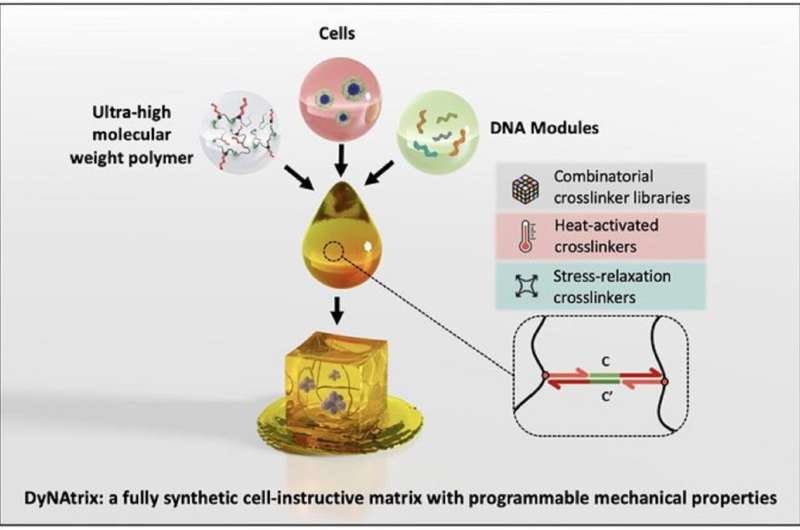This article has been reviewed according to Science X's editorial process and policies. Editors have highlighted the following attributes while ensuring the content's credibility:
fact-checked
peer-reviewed publication
trusted source
proofread
Programmable DNA hydrogels for advanced cell culture and personalized medicine

In-vitro culture of biological cells plays an important role in advancing biological research. However, currently available cell culture materials have significant drawbacks. Many of them are derived from animal sources, leading to poor reproducibility and making it difficult to fine-tune their mechanical properties. Therefore, there is an urgent need for new approaches to create soft and biocompatible materials with predictable properties.
The team of Dr. Elisha Krieg at the Leibniz Institute of Polymer Research Dresden has developed a dynamic DNA-crosslinked matrix (DyNAtrix) by combining classical synthetic polymers with programmable DNA crosslinkers. DNA's highly specific and predictable binding gives researchers unparalleled control over key mechanical properties of the material.
Published in Nature Nanotechnology on August 7, their research shows how DyNAtrix enables systematic control over its viscoelastic, thermodynamic and kinetic characteristics by simply changing the DNA sequence information. The predictable stability of DNA crosslinks allows the stress-relaxation properties to be rationally tuned, mimicking the characteristics of living tissues.
DyNAtrix is self-healing, printable and exhibits high stability and controllable degradation. Cell culture with human mesenchymal stromal cells, pluripotent stem cells, canine kidney cysts, and human trophoblast organoids demonstrate the high biocompatibility of the materials.
The programmable properties of the material point to promising potential for new applications in tissue culture. The ongoing studies focus on the effect of viscoelastic properties on cell and organoid development. In the future, DyNAtrix can be used in basic research and personalized medicine, for example, to reproduce and investigate patient-derived tissue models in the laboratory.
More information: Y.-H. Peng et al, Dynamic matrices with DNA-encoded viscoelasticity for cell and organoid culture, Nature Nanotechnology (2023). DOI: 10.1038/s41565-023-01483-3
Journal information: Nature Nanotechnology
Provided by Leibniz Institute for Polymer Research





















